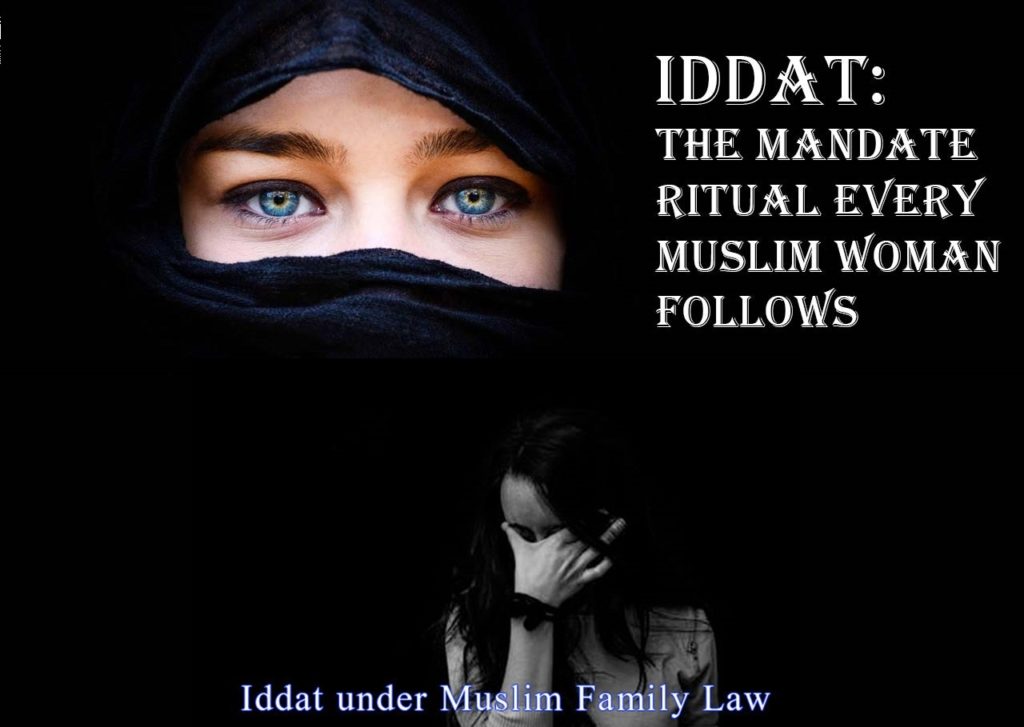
Iddat for Muslim Widowed Women
Iddat for Muslim Widowed Women
What is Iddat?
In Islam, iddah or iddat (Arabic: العدة; period of waiting) is the period a woman must observe after a divorce, during which she may not marry another man. One of its main purposes is to remove any doubt as to the paternity of a child born after the divorce. In case of divorce, Iddat is defined and explained as per Quran in Ayah 2:228 as “And the divorced women shall wait with their Nafs for three monthly periods. And it is not lawful for them to conceal what Allah has created in their Ar-Rahaami, if they believe in Allah and the day of Akhira.” Here is the divine instruction for the Iddat period – which is three monthly periods, that the wife has to complete by herself, when a divorce process has been initiated). The ayah is also highlighting the reasons behind the iddat and the divine wisdom, which is to clear both the spouses from any misunderstanding and false accusation, through a clear process of identification that if the wife is pregnant or not. And if she is pregnant, then the explicit Divine instruction is not to conceal what Allah has created in their wombs.
What About Iddat in case of Widowed Women
As per generally accepted norm, a Muslim widowed women also has to undergo iddat period, which is basically terms as the period a woman must observe after the death of her husband during which she may not marry another man. One of its main purposes is to remove any doubt as to the paternity of a child born after the death of the prior husband. The length of ‘iddah’ in case of a widowed woman, is four lunar months and ten days after the death of her husband, whether or not the marriage was consummated. If a woman is pregnant when she is widowed, the ‘iddah lasts until she gives birth. Muslim scholars consider this directive to be a balance between mourning of husband’s death and protecting the widow from criticism that she might be subjected to from remarrying too quickly after her husband’s death. This is also to ascertain whether a woman is pregnant or not, since four and a half months is half the length of a normal pregnancy. All of these are based on misinterpretations of Quran and lead to gross injustices towards a grieving widow.
General Misconceptions & Malpractices!
The ayah 2:234 is misinterpreted to create and confirm the misconception that the Iddat/waiting period for women in case of the deaths of their husbands is 4 months and 10 days. But this ayah is not talking about the Iddat period for women to confirm the pregnancy as is normally misinterpreted. Had this been for the period to confirm the pregnancy, Allah would have mentioned the same just like in case of it’s clearly highlighted in the case of divorced Women, in the Ayah 2:228 as Iddat period of 3 months for pregnancy with explicit instructions to the women not to conceal what Allah has created in their wombs. No such instructions or the word of Iddat is mentioned in the Ayah 2:234.
Divine Instructions & the Wisdom behind it!
In the Ayah 2:234, a period of 4 months and ten days is nothing to do with establishing pregnancy for the women, but basically a period of margin, a space, a grieving and caring period for them- either the husband or the wife whose spouse died. A point to note here is that in the Ayah 2:226, “For those who swear from their Nissa is a waiting of four months…”, here a period of 4 months is given as a waiting period in order to avoid decisions taken in a rush or under emotions. Therefore, it’s a sort of bringing the person back to normal w.r.t. to the person’s emotional and psychological state of mind. Similarly, here in the ayah 2:234 as well, the divine guidance is aligned with the care and consideration of a grieving period for the widowed person, either a husband or a wife whose spouse has died.
The ayah 2:234 is talking to us, as the near and dear ones of the widowed both men and women and the correct interpretation of the ayah is 2:234 “And those among you who die and leave widows (either man or woman) behind, wait for their Nafs for four months and ten days. Then when the term is reached, there is no blame on you concerning what they do in their Nafs with Ma’roof. And Allah is acquainted with what you do..” It is talking about the period of 4 months and 10 days as a period of grief for the widowed, during which the society, the community, the relatives, the near and dear ones, have been instructed to take care of them, to give them space and time for the healing, to not disturb anything around them, to let them be. During this time, they are not supposed to be disturbed, or expected to make any changes or make any major decision regarding them, until this term is over.
Once the term is over, then and after, there is no blame on the community, the society, the relatives, concerning any decisions that they make for themselves in Maroof. Basically, the society, the community, and relatives are bound by Quran not to disturb the widowed during this grieving time period but the widowed are not bound for anything, it is all of their choice to do whatever they feel like with Maroof i.e. respectful, decent and acceptable way.
Conclusion
There is no such thing as iddat period for the Muslim widowed women. But for the widowed person, either male or female, there is a period of grieving and support by the society, the community, their near and dear ones, their relatives etc. it is given as per Quran which is a period of 4 months and 10 days. Basically, the society, the community, and relatives are bound by Quran not to disturb widowed persons but the widows are not bound for anything, it is all of their choice to do whatever they feel like with Maroof i.e. respectful, decent and acceptable way.
Source: Concept behind Surah Al-Baqarah Ayah No. 233 to 237, i.e. 2:233 to 2:237.
https://quranthinkers.com/projects/smart-phone-app-quranwords-concepts-by-wqt/

assalamu alikum , Brother I have a doubt
وَالَّذِينَ يُتَوَفَّوْنَ مِنْكُمْ وَيَذَرُونَ أَزْوَاجًا يَتَرَبَّصْنَ بِأَنْفُسِهِنَّ أَرْبَعَةَ أَشْهُرٍ وَعَشْرًا This is tha aayath you mentioned right?
But if we look at the aaya we can see بِأَنْفُسِهِنَّ this “Hu-nnah” word mentioned about women ,So this Iddha is about only for women not men ,is’nt it?
As per our understanding, these Arabic grammar rules are man-made, external to Quran, done with patriarchal mindsets and hence open to misinterpretations the divine guidance. There is gender disparity as per Deen and there is no injustice. Quran does not talk about genders at all and all divine laws are applicable regardless of one’s gender.
Hope it clarifies